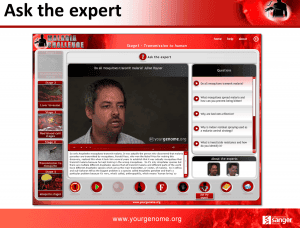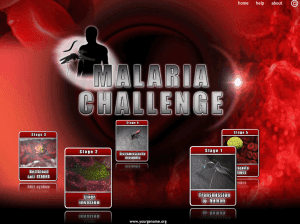 I work on malaria, and specifically how the parasites that cause malaria recognise and get inside our red blood cells. Malaria parasites have incredibly complicated life cycles, passing back and forth between humans and mosquitoes, but it is when they infect our red blood cells that they cause all the symptoms of malaria, including death – nearly a million children die from malaria every year. Our idea is that if we understand how they invade our red blood cells, we can come up with vaccines or drugs to try to block invasion, and so prevent malaria infection.
I work on malaria, and specifically how the parasites that cause malaria recognise and get inside our red blood cells. Malaria parasites have incredibly complicated life cycles, passing back and forth between humans and mosquitoes, but it is when they infect our red blood cells that they cause all the symptoms of malaria, including death – nearly a million children die from malaria every year. Our idea is that if we understand how they invade our red blood cells, we can come up with vaccines or drugs to try to block invasion, and so prevent malaria infection.
The actual process of invasion is fascinating – it is literally one cell forcing it’s way inside another, with the parasite almost dragging the surface of the red blood cell around itself until it winds up inside, where it is protected from the human immune system and surrounded by lovely haemoglobin. We use haemoglobin to transport oxygen, but the parasite uses it as food to grow and multiply.
But frankly, so many things about malaria are fascinating. Did you know that before antibiotics, people were deliberately infected with malaria as a treatment for syphilis? It worked, as long as you cured the malaria in time… Or that malaria is not just a human problem? There are different malaria parasite species that infect birds and rats and lizards and snakes and monkeys and apes. Humans originally caught malaria from apes (presumably from a mosquito that had recently bit a gorilla, then bit one of our ancestors), and even today, there is one species of malaria parasite that regularly transfers malaria from monkeys into humans.
So malaria is an incredibly fascinating subject, but when trying to communicate that to non-scientists, I have found lots of people get put off by the life-cycle of the parasite. It’s actually not all that complicated, but seems intimidating in part because parasitologists have given lots of different names to all the different stages, and draw complex charts with loads of arrows.
trying to communicate that to non-scientists, I have found lots of people get put off by the life-cycle of the parasite. It’s actually not all that complicated, but seems intimidating in part because parasitologists have given lots of different names to all the different stages, and draw complex charts with loads of arrows.
To try to solve that problem, I have been helping the Public Engagement team at the institute where I work, the Wellcome Trust Sanger Institute near Cambridge, to build a web tool to help explain the malaria life-cycle. The team animated some stages of the life cycle, I persuaded colleagues to be interviewed on camera to discuss some of the biggest problems in malaria, like drug resistance and vaccine development, got interviewed myself, and it all got packaged together in one big interactive tool called Malaria Challenge. We’re really proud of the results, and it’s all free online at the Sanger Institute’s ‘Your Genome’ website (http://www.yourgenome.org/teachers/malariachallenge.shtml). There are even teacher tools, to help teachers plan lessons using the resource. Hopefully it will introduce lots of people to the fascinating world of malaria research, and since the malaria life-cycle is on some A-level syllabuses, it might help some people pass a few exams as well!
We are now trying to spread the word about this fantastic science communication tool to as many schools as we can, by talking to teachers and spreading the word on the web. To help with this, I used the money that I won on I’m a Scientist, Get me out of here! to get loads of CDs burned with the full Malaria Challenge on them. We are going to mail copies out to all the schools that participated in Argon Zone (thanks everyone for your support!), and distribute the rest for free as widely as possible to schools all over the country.
I’m a Scientist, Get me out of here! was a fantastic experience, and really rewarding for me as a scientist. I am totally enthused by the format as a tool for science communication, and we have since run a mini-version at the Sanger Institute, connecting a whole range of scientists here to schools in our local area. The fact that taking part in I’m a Scientist, Get me out of here! also gave me prize money to help explain the wonders of malaria to as many people as possible was just the icing on the cake!
Julian won the Argon Zone in March 2011
